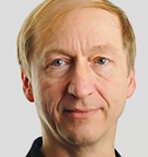James Prize Banner

About the James Prize in Science and Technology Integration
The James Prize in Science and Technology Integration honors outstanding contributions made by researchers who are able to adopt or adapt information or techniques from outside their fields, and thus integrate knowledge from two or more disciplines (e.g., engineering, mathematics, physics, chemistry, biology, biomedicine, geosciences, astronomy, or computational sciences) to solve a major contemporary challenge not addressable from a single disciplinary perspective. The prize was established in 2020 by Robert James and carries with it a $50,000 prize.
Press Release Announcing Prize Creation»
Most Recent Recipients
 |
Harald F. Hess, Howard Hughes Medical Institute, will receive the 2023 James Prize in Science and Technology Integration.
Hess’s groundbreaking work in scanning probe, optical, and electron microscopy has transformed understanding in physics and biology.
Fusing ideas from different scientific disciplines and industry, Hess’s work ranges from developing novel new forms of microscopy to refining existing microscopy technologies for the purpose of revealing new physical or biological attributes. Read more about Hess' work»
Watch Hess' acceptance speech»
Recipients:
Harald F. Hess (2023)
For his revolutionary advancements in multiple methodologies from creating states of matter close to absolute zero, to imaging molecules in cells below the diffraction limit, to imaging subcellular architectures with isotropic resolution across entire tissues. His technologies have been adopted by hundreds of physicists and biologists to advance their fields.
Read more about Hess' work»
Watch Hess' acceptance speech»
John A. Rogers (2022)
For his development of unique, biocompatible forms of electronic, optoelectronic, and microfluidic technologies; pioneering their use in areas ranging from neuroscience to clinical care; and converting them into widely available forms, through interdisciplinary approaches in materials science, technology integration, and translational research in health and medicine.
Read more about Roger's work»
Watch Roger's acceptance speech»
Allon Klein and Aviv Regev (2021)
For their concurrent development of now widely-adopted massively-parallel single-cell genomics to interrogate the gene expression profiles that define, at the level of individual cells, the distinct cell types in metazoan tissues, their developmental trajectories, and disease states, which integrated tools from molecular biology, engineering, statistics, and computer science.
Read more about their work»
Watch their acceptance speech»
Press Release»

